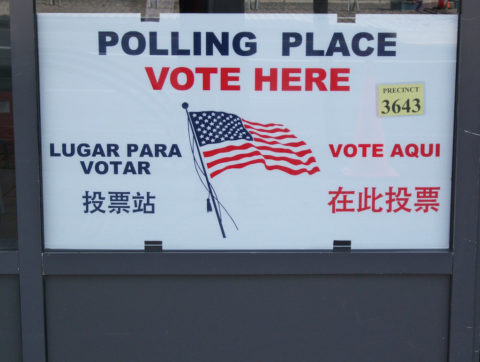From the free-to-cheapskates excerpt of Andrew Sullivan’s Weekly Dish:

“Polling Place Vote Here” by Scott Beale is licensed under CC BY-NC-ND 2.0 .
The day I received my absentee ballot from the DC government, there was a story in the Washington Post about the DC Council’s imminent vote:
The bill would eliminate most mandatory minimum sentences, allow for jury trials in almost all misdemeanor cases and reduce the maximum penalties for offenses such as burglaries, carjackings and robberies.
Over the past few years, violent crime in DC has been rising fast. Last year the murder rate was the highest since 2003, and this year the death toll is slightly higher so far. Carjackings are up 36 percent and robberies are up 57 percent. Almost all this hideous violence is inflicted on African-Americans, including many children. It permeates outward, creating a deeper public sense of insecurity and out-of-control crime. Tent cities are now all over the city. People suffering from mental illness patrol the streets. You feel the decline in law and order, the slow fraying of the city, every day.
And yet the Council has decided that now is the time to make it harder to prosecute and easier to defend violent criminals, partly in the name of “equity”. Yes, it’s part of a longstanding “modernization” of the criminal code, but they had to include these provisions and now? And this isn’t new. Just before the crime explosion took off, the DC mayor had “Black Lives Matter” painted on the street in letters so large you could read them from a plane, and allowed “Defund the Police” to remain next to it. That summer, woke mobs were allowed to harass anyone in their vicinity, yelling slogans that vilified all police — and the MSM took the side of the bullies. After the summer of 2020, the DC police force dropped to its lowest level in two decades.
So guess what? I’m going to vote for the Republican and the most conservative Independent I can find next Tuesday. And I can’t be the only Biden and Clinton and Obama voter who’s feeling something like this, after the past two years.
There was no choice in 2020, given Trump. I understand that. If he runs again, we’ll have no choice one more time. And, more than most, I am aware of the profound threat to democratic legitimacy that the election-denying GOP core now represents. But that’s precisely why we need to send the Dems a message this week, before it really is too late.
By “we”, I mean anyone not committed to the hard-left agenda Biden has relentlessly pursued since taking office. In my view, he and his media mouthpieces have tragically enabled the far right over the past two years far more than they’ve hurt them. I hoped in 2020 that after a clear but modest win, with simultaneous gains for the GOP in the House and a fluke tie in the Senate, Biden would grasp a chance to capture the sane middle, isolating the far right. After the horror of January 6, the opportunity beckoned ever more directly.
And yet Biden instantly threw it away. In return for centrists’ and moderates’ support, Biden effectively told us to get lost. He championed the entire far-left agenda: the biggest expansion in government since LBJ; a massive stimulus that, in a period of supply constraints, fueled durable inflation; a second welfare stimulus was also planned — which would have made inflation even worse; record rates of mass migration, and no end in sight; a policy of almost no legal restrictions on abortion (with public funding as well!); the replacement of biological sex with postmodern “genders”; the imposition of critical race theory in high schools and critical queer theory in kindergarten; an attack on welfare reform; “equity” hiring across the federal government; plans to regulate media “disinformation”; fast-track sex-changes for minors; next-to-no due process in college sex-harassment proceedings; and on and on it went. Even the policy most popular with the center — the infrastructure bill — was instantly conditioned on an attempt to massively expand the welfare state. What on earth in this agenda was there for anyone in the center?





